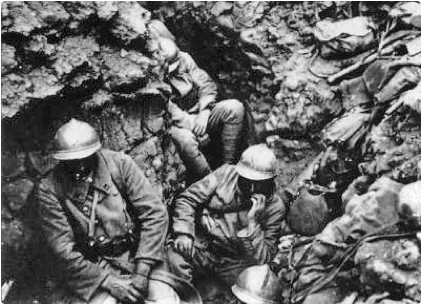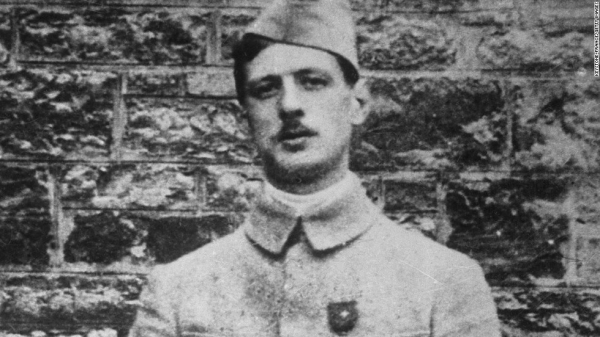Armies Are Exhausted; Soldiers are Deserting
Captain De Gaulle Attempts Escape, Over and Over Again.
(20 March) The fierce battle for the French town of Verdun is ceaseless. Neither the French nor the Germans are willing to abandon the fight, which brings minuscule gains for each.
The Germans attack on this date, one hundred years ago. “At first,” writes historian Martin Gilbert, “the attack went badly, with many German infantrymen being buried alive in the deep jumping-off points they had dug facing the French frontline, which the French had spotted and blown in.”

French soldiers at Verdun, 1916.
Still, reports Gilbert, “The French troops in front of them had been in the trenches too long and their morale was too low.”
Both sides are exhausted, but they press on.
Some French soldiers fall into German hands, with devastating consequences.
“Deserters, reaching the German lines gave details of the passages through the French wire.”
“Within four hours of the German attack,” writes Gilbert, “the French position was captured, a whole French brigade being surrounded and surrendering: 2825 men, twenty-five machine guns and, to the amusement of the German war correspondent who broke the story, a full box of medals — the Croix de Guerre — ready for distribution.”
It is a German triumph and they try to capitalize on it, “to follow up their success,” writes Gilbert. “But French machine gunners, firing at them from three sides, led to 2400 German casualties and no further gains.
The French president, Raymond Poincare, “who had been ashamed for French deserters…could breathe more freely, at least for awhile.”
One of the French officers who falls into German hands at Verdun is Captain Charles de Gaulle, the future president of France. According to Gilbert, “De Gaulle was taken to a German military hospital in Mainz, then to the first of several prisoner-of-war camps further east from which he tried, with great ingenuity, to escape,”

Captain Charles De Gaulle.
In fact, De Gaulle does escape. “On one occasion, he got within sixty miles of the Swiss frontier, but he was still in captivity when the war ended.”
Gilbert reports that among de Gaulle’s prison activities, he teaches a fellow prisoner from Russia Mikhail Tukhachevsky to speak French. Later Tukhachevsky will be declared by Stalin a Marshall of the Soviet Union. But in 1937, Tukhachevsky will be executed by Stalin.
Just as De Gaulle continues to attempt escape, so does Tukhachevsky, and his efforts prove more successful than De Gaulle’s. “At his sixth escape attempt,” reports Gilbert, “he managed to get back to Russia and to active service.”
The French situation at Verdun is dire, so the French army tries to relieve this pressure by urging their Italian ally to launch the fifth battle of the Isonzo Front in the Alps Mountains. But the attack runs into bad weather. “Five days of fighting were brought to an unexpected halt, when snow and rain made the mountain battlefield impassable.”
The Italians make some gains, but then promptly lose them in the face of Austrian gas attacks, which force the Italians to give up their modest gains.
At Verdun, the French make heroic efforts to keep their frontline supplied adequately. Six-thousand French trucks make it to the frontline every day, carrying 50,000 tons of supplies and 90,000 men each week…”a sustaining and feeding of a battlefield and of the greedy guns,” writes Gilbert, “unprecedented in warfare.”

Hi, Mike. Glad to see you have conquered your technology problems. And another great post today. – alex
Thank you for this project! Especially on beautiful spring days like this one, I think of those men in that desperate, despairing situation. So sad- and now, I think, past the point of no return.
Thanks so much for all your work on this blog, I was on tenterhooks waiting for the resumption of posting. I have followed WW2today for over five years and am so happy to see a corresponding effort re: WW1
Thanks for your great project,I really enjoy this history.
My Grandfather was a medic in France and this has helped me understand some of what he went thru.